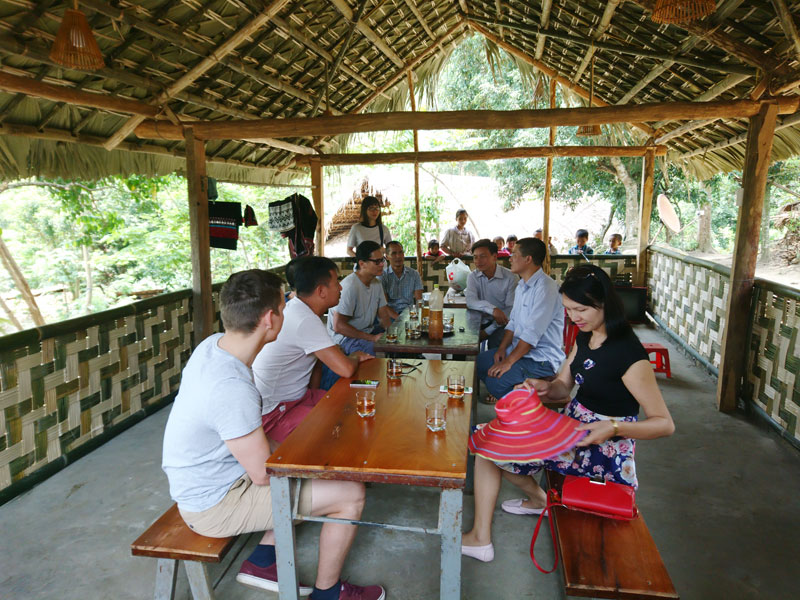
(HBO) - Sung village in Cao Son commune, Da Bac district is at an altitude of some 530 metres above sea level, in front of the majestic Bieu mountain range, at the foot of terraced rice fields, and stretching along a romantic hillside. It is a village of the Dao ethnic minority group, with many traditional cultural values preserved by local people.

Tourists take
photos with local people in front of a traditional house of the Dao ethnic
minority people in Sung hamlet, Cao Son commune, Da Bac district.
Developing community-based
tourism since 2017, Sung village is extremely popular among foreign tourists thanks
to its rustic and unspoiled look. Around 70-80 percent of visitors coming to
the village annually are from European countries such as the UK, France, Belgium,
and Ireland.
Visitors will not only be able to explore the local culture, learn of traditional
customs, admire the architecture of houses, and hear of the lives of local people,
but can also enjoy ethnic minority cuisine such as mountainous chicken, stream fish,
young bamboo, "Can” wine, and "Hoang” wine, etc. In particular, they can join
with local people through activities such as rice transplanting, forest planting,
animal husbandry, rice cooking, and fishing.
There are three homestays in the area - Thanh Chung, Xuan Lan, and Nhat Quy - catering to domestic and international guests. They
are highly regarded by visitors as they retain the original architecture of traditional
Dao houses. Here, visitors can enjoy traditional dishes, explore the daily life
of the Dao people through activities such as brocade weaving, and walk through the
forest.
The original earthen-walled
houses along with the traditional customs and friendliness of local people are attractive
to tourists. After a long period of being affected by COVID-19, community tourism
has been restored in the hamlet, with the first international visitors now
arriving./.
A diverse chain of eco-tourism and resort destinations concentrated in Hoa Binh city and the districts of Tan Lac, Da Bac, and Luong Son… Along with the launch of several key high-quality resort tourism projects, these developments have reshaped the landscape and enhanced the appeal of Hoa Binh as a travel destination.
Boasting diverse terrain, a mild climate, and rich natural resources, Cao Phong district is increasingly asserting its place on Vietnam’s tourism map, attracting both domestic and foreign visitors. The district is renowned for its stunning landscapes, majestic mountains, a crystal-clear hydropower lake, and the unique cultural identity of local ethnic groups.
With its pristine landscapes, unique cultural heritage of Muong ethnic minority, and an expanding range of visitor experiences, Tan Lac district of Hoa Binh has fast become a captivating destination for both domestic and international tourists.
Until now, Sung village in Cao Son commune, Da Bac district remains the only Dao ethnic community in Hoa Binh province to develop a community-based tourism model. Beyond its untouched natural landscapes, cultural identity serves as the cornerstone attraction for visitors.
Alongside the diverse cultural identities of the Kinh, Muong, Tay, Thai, Dao, and Mong ethnic people, Hoa Binh province is also renowned as the "capital" of the northwestern Vietnamese cuisine, offering unique and distinctive dishes. At festivals, during Lunar New Year (Tet), or on significant family or community occasions, special dishes are prepared, leaving a lasting impression on visitors.
A Phong Linh (Yellow Tabebuia) flower garden in Thang village, Thach Yen commune, Cao Phong district is currently in full bloom, drawing a large number of visitors.



